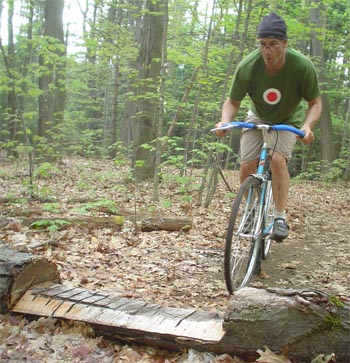[ 63XC.COM | HOWTO | THE CRUX ]
The Crux
You know it the first time you confront it. The butterflies in your stomach fly inside loops. Your diaphragm rises, your muscles tense up uncontrollably. You are on red alert. You're riding fixed on dirt. It's time for you to make a log crossing and you just aren't sure where those mind-of-their-own crankarms are going to be when you get there. So you keep pedaling and hope. Always keep pedaling. Sure, you can ollie-hop and adjust your crank position. Or lock up the rear for a moment. With enough practice you start to get a feel for your crankarm timing. I like to just keep pedaling and see what happens. Go with the flow. One local trail I frequent is a training ground for log crossings. Singles, doubles, notches, complex compounds, and manmade ramps punctuate this otherwise stream-of-consciousness trail. There must be 25 varied crossings in a three mile loop. Even though I've been thrown off about six times now, I can't keep myself out of there. In the beginning, I was intimidated by all the little maneuvers on the fix: curbs, wood ramps, and log crossings. Freewheeling habits die hard. The finicky little 'up' curb trick had me foiled for a few days, until I stopped worrying about my feet and learned to use my upper body and arms. Similarly, the idea of slipping off one of the local foot-wide ramps while clipped in on a fix scared me... I'll admit it. After a few tries, I learned to accelerate onto the ramp. The faster I went, the easier it was to stay on. Easy! But still the log crossings remain unconquered and vexing. The crux of the up-and-over is to get the front wheel unweighted until it is at or near the apex of the crossing, then to magically weight it and unweight the rear. It's a matter of shifting your body weight forward at the right moment. Timing is everything. If you weight the front too soon, you risk stalling out or slipping the front wheel. Do it too late, and you risk running the rear into the log, causing a pinch flat or (worse) a penguin flight. Get the weight/unweight thing right, and you can survive even a badly-timed crankarm. I call this crank-hopping. Generally, momentum is your friend, but it may take you to task if you rush things! Practice will build your skills to the point where you can handle all but the most extreme crossings. And, if you're fearless, you can always try the ones you don't have the skills for too! There are other complications. You roll up to a combo, maybe one with one big log that's been 'ramped' with a bunch of smaller logs on the approach side. You ponder, then decide to go for it. As you pull up the front wheel and commit, you notice the telltale chainring marks atop the centerpiece log. At that moment, you know that there is no ramp down the other side. You know that a quick prayer is in order. You're committed and you're on fixed. Too late to worry about the chainring, keep pedaling! I find that staying committed is safer than bailing. (An interesting theme that, ripe for elaboration some other time.) You may be able to pedal out of a high-center incident. Sometimes the ring clears anyway! Other times you're short on speed and, when you get on top, you stall. Or, worse, you karate-kid-crane-pose-stall with bad crankarm timing: one at twelve o'clock and one at six. This is a position of great vulnerability. You have the least torque of any point in the pedaling cycle and it is the hardest position from which to get out of your pedals if you decide to bail. At this point you get to show off your finely honed fixed-gear trials skills, you get lucky and ride it out, or you fall hard. I've done the latter more than once. I guess we've all done it. There is an element of magic to it--the fixed-gear log crossing--that goes beyond explanation. You can just make it over most of the time without ever having to know why it works. Why do we set these arbitrary rules for ourselves? Because, by creating challenges out of the mundane, we make our lives more exciting and humorous. Fixed gear trail riding introduces a few unique problems and delivers equally distinctive rewards, often unexpected. Remember, ride often and always pedal! [ TOP ] |
Writer
John 'Gonterian' Gonter resides in Burlington, Vermont where there are more fixed gear commuter bikes than anywhere he's ever seen. In August he will 'compete' in the 2005 SSWC on his Fixed Gear Vulture mountain bike.
Date
v1.0 written May 2005
Related
John describes his Univega fix here.
